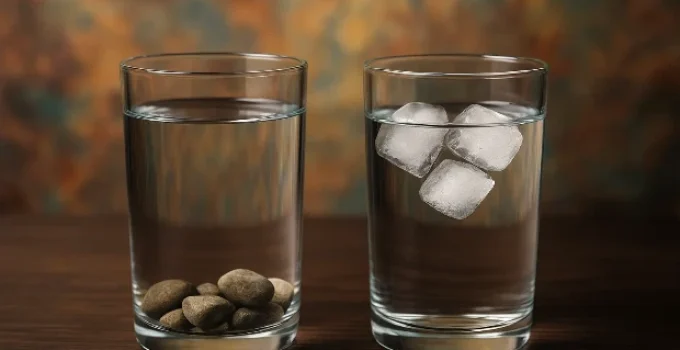Why Does Ice Float on Water?
✅ Answer:
Ice floats on water because it is less dense than liquid water. When water freezes, its molecules arrange in a way that takes up more space, making ice lighter per unit of volume than the water it came from.
🧭 Dive Deeper:
- What Is Density?
- How Do Water Molecules Behave in Ice?
- Why Is Ice Less Dense Than Water?
- What Happens When Ice Floats?
- Real-Life Examples of Floating Ice
- Why This Matters in Nature and Climate
- 🎯 Final Thoughts
- 📚 References
What Is Density?
Density is how much mass (or stuff) is packed into a certain amount of space. It’s calculated using this formula:
Density = Mass ÷ Volume
If something is denser than water, it will sink. If it’s less dense, it will float.
📘 Quick Example:
A rock sinks in water because it’s very dense. A beach ball floats because it’s full of air and not very dense.
How Do Water Molecules Behave in Ice?
Water is made of H₂O molecules—two hydrogen atoms and one oxygen atom.
When water is in liquid form, the molecules:
- Move freely
- Are very close together
But when water freezes, the molecules:
- Slow down
- Arrange in a hexagonal (six-sided) pattern
- Stay farther apart from each other
This crystal pattern makes ice less dense than liquid water, even though it’s made of the same molecules!
🧬 Molecular Fact:
The open structure of ice crystals creates empty spaces, which makes the solid form expand [1].
Why Is Ice Less Dense Than Water?
Even though it might seem strange, the solid form of water (ice) is less dense than the liquid form.
| State of Water | Molecule Arrangement | Density (g/cm³) |
|---|---|---|
| Liquid Water | Tight and close together | 1.00 |
| Ice | Spread out, rigid shape | 0.92 |
Because ice has fewer molecules in the same space, it floats!
🎯 Fun Stat:
Only a few substances in nature expand when they freeze—water is one of the rare ones [2].
What Happens When Ice Floats?
When ice floats in water:
- About 90% of the ice stays below the surface
- Only 10% is visible above the water
This happens whether it’s an ice cube in a glass or a giant iceberg in the ocean!
🚢 Did You Know?
Most of an iceberg is hidden underwater—just like the one that sank the Titanic in 1912.
Real-Life Examples of Floating Ice
You can see floating ice in many places:
- Ice cubes floating in drinks
- Lakes and ponds with frozen surfaces in winter
- Glaciers and icebergs floating in oceans
- Snow and frost sitting on puddles
Because ice floats, it acts like a blanket on lakes and oceans in cold places. It keeps the water below from freezing solid.
Why This Matters in Nature and Climate
The fact that ice floats is very important for life on Earth.
🌍 In Nature:
- Floating ice protects fish and aquatic life by insulating the water beneath.
- Without this effect, lakes and oceans could freeze from top to bottom, killing everything inside.
🌡️ In Climate:
- Melting glaciers and icebergs don’t raise sea levels as much because they are already floating.
- But ice on land, like Antarctica’s ice sheets, can cause sea level rise when it melts.
🧊 Surprising Impact:
Without floating ice, life in polar regions would be very different—or impossible [3].
🎯 Final Thoughts
So, why does ice float on water? Because it’s less dense due to the special way water molecules arrange when they freeze. This rare and important property of water helps protect life, shape our climate, and even lets your ice cubes stay at the top of your drink!
Water’s behavior is more than just cool—it’s crucial for life as we know it.
📚 References
- U.S. Geological Survey (USGS). “Water Density.”
https://www.usgs.gov/special-topics/water-science-school/science/water-density - ChemTalk. “Physical and Chemical Properties of Water.”
https://chemistrytalk.org/properties-water-physical-chemical/ - National Snow & Ice Data Center. “The Science of Sea Ice.”
https://nsidc.org/learn/parts-cryosphere/sea-ice/science-sea-ice
📌Learn More About Compound Water (H2O)
- What Is the Boiling Point of Water?💧What Your Kettle Can Teach You About Physics
- Does Water Expand When It Freezes? 💧Ice and Volume Explained
- Why Does Ice Float on Water? 💧 The Surprising Science of Frozen H₂O
- Why Does Water Have Surface Tension? 💧 The Invisible Skin on Every Drop
- Why Is Water Called the Universal Solvent? 💧 The Science of What It Can Dissolve
